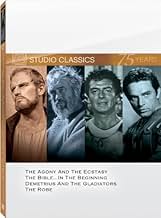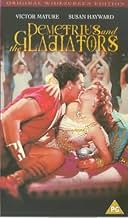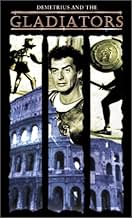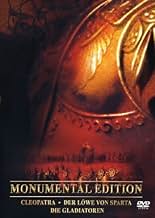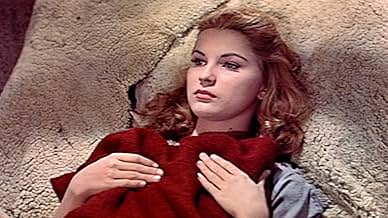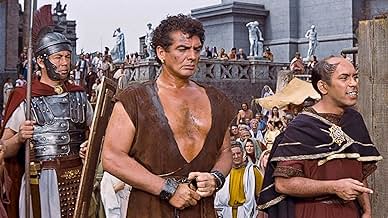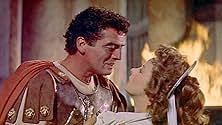अपनी भाषा में प्लॉट जोड़ेंIn first-century Rome, Christian slave Demetrius is sent to fight in the gladiatorial arena and Emperor Caligula seeks Jesus' robe for its alleged magical powers.In first-century Rome, Christian slave Demetrius is sent to fight in the gladiatorial arena and Emperor Caligula seeks Jesus' robe for its alleged magical powers.In first-century Rome, Christian slave Demetrius is sent to fight in the gladiatorial arena and Emperor Caligula seeks Jesus' robe for its alleged magical powers.
- Soldier
- (बिना क्रेडिट के)
- Gladiator
- (बिना क्रेडिट के)
- Cousin
- (बिना क्रेडिट के)
- Gladiator
- (बिना क्रेडिट के)
- Varus
- (बिना क्रेडिट के)
- Gladiator
- (बिना क्रेडिट के)
- Guard-Escort of Prisoners
- (बिना क्रेडिट के)
फ़ीचर्ड समीक्षाएं
The central character, Demetrius, is a former slave who, after assaulting a soldier who is molesting his girlfriend Lucia, is sentenced to fight in the arena as a gladiator. This causes him difficulties as he is a Christian whose moral code will not permit him to kill another man, even in self-defence. He survives, however, largely because he attracts the attention of Messalina, the wife of Claudius, uncle of the Emperor Caligula. Later, believing that Lucia has accidentally been killed by another gladiator, Demetrius renounces his Christian faith, and fights fiercely, killing the man he believes to have been responsible for her death and several others. His courage and skill with a sword lead to his being made a tribune in the Praetorian Guard, and he becomes Messalina's lover. As in "The Robe", the robe which Christ wore to His crucifixion plays an important part in the film; Caligula wants to get his hands on it because he believes that it has magical powers and that it will give him the secret of eternal life.
Several of the epics of this period combined, incongruously, an improving religious message with a good deal of eroticism, with much bare female flesh on display- examples include "Solomon and Sheba", "Esther and the King" and "Salome", where we get to see the famous dance of the seven veils, but it is made clear that, contrary to the Biblical version of the story, Rita Hayworth's character is in fact a virtuous heroine who only is flashing her legs in public in a desperate attempt to save John the Baptist from his fate. There are elements of this strange combination of godliness and sexiness in "Demetrius", but the sexiness is very much downplayed. Messalina's notorious promiscuity is alluded to rather than shown on screen, and the scene between the gladiators and the women brought in to entertain them may be an orgy, but it is a very decorous one. The film-makers were clearly more interested in the element of godliness, and, unlike some films of this type, "Demetrius" raises genuine moral issues about pacifism, non-violence and Christian forgiveness.
Demetrius himself is a man who goes through a crisis of faith and abandons his Christian beliefs in favour of an ethic based on revenge and worldly ambition. His conscience, however, is troubled, especially after he is reproached by his old friend St Peter. He is a more complex and interesting figure than many epic heroes, so it is unfortunate that the part was played by Victor Mature, an actor whose success often seemed to owe more to his ruggedly masculine good looks and his virile physique than to his acting technique. Susan Hayward (an actress who could often look bored and listless when asked to play roles that did not interest her) makes a weak Messalina. Neither give their worst performance (in Hayward's case that must surely have been "The Conqueror"), and Mature brings a certain rough sincerity to his part, but I felt that the film might have been improved with other actors in these roles.
Nevertheless, there was much I enjoyed about the film. Michael Rennie was appropriately dignified as Peter, played as a sort of ascetic philosopher, although I would agree with the reviewer who pointed out that it would be hard to imagine him ever working as a fisherman. I also liked William Marshall as Glycon, the former African king now forced to fight as a gladiator, who befriends Demetrius. ("Spartacus", a better film than "Demetrius" although it owes something to it, also features a sympathetic black gladiator who befriends the hero).
Jay Robinson, who played Caligula, has been criticised by some reviewers for overacting, although I must say I liked his performance. Historians have doubted whether the real Caligula was actually insane, although he was undoubtedly cruel and eccentric, but in the context of this film he is definitely presented as a lunatic, a man who has literally been driven mad by power to the point where he believes himself to be a god. (Not even Hitler went that far). There is an interesting contrast with a modern epic, "Gladiator", in which Joaquin Phoenix plays another tyrannical Roman Emperor, Commodus, as a basically weak and insecure young man. Although Phoenix's performance works well in the context of that particular film, the way the role of Caligula was written called for something quite different- the sort of ranting, over-the-top performance which might be unfashionable now but would have been less controversial in the fifties.
Although the standard of the acting is mixed, I generally enjoyed the film. It does not reach the standard of the really great epics, such as "Spartacus" or "Ben-Hur", but it works well on the level of spectacle, with fine sets and costumes and some exciting scenes of gladiatorial combat, and has a more intelligent script than many epics. 7/10
When Twentieth Century-Fox filmed "The Robe", they already knew that it would be followed up by "Demetrius and the Gladiators". In fact, the movies were filmed like one huge film and then separated into two as the studio was THAT confident that "The Robe" would be a big hit--which it was. And, for that matter, so was its sequel. Fortunately, you can watch either without watching the other.
The film begins with a clip from the previous film--just before the two main characters (Richard Burton and Jean Simmons) were executed. Soon you learn that the Apostle Peter and his followers (including Demetrius--Victor Mature) are the keepers of the robe that Jesus wore to the cross. Oddly, however, the Emperor Caligula is very fascinated by the robe and insists he must have it. When Demetrius tries to hide it, he's sentenced by this loony emperor to become a gladiator--a sure death since Demetrius has vowed never to fight now that he's become a Christian. However, the lure sexy Messalina (Susan Hayward) and his own desire to live make it difficult, if not impossible, to fulfill this oath. What's next? See for yourself.
There's no doubt about it--this film is a spectacle. It has huge scenes, huge gladiatorial fights and lots of beautiful sets and costumes. While it's not a fantastic film, the action is there and the film is fascinating. Part of this is due to the supporting performances. William Marshall shows what a wonderfully unsung actor he was. Had he been born later, his wonderful voice and acting skills would have made him a top star--something not possible for a black actor during this age. Additionally, while Jay Robinson's version of Caligula is not in the least bit subtle, it IS very entertaining and fun to watch. All in all, a decent film that is far better than I'd suspected.
UPDATE: Since this review, I've finally seen the precursor, "The Robe", and was surprised just how bad it was compared to "Demetrius and the Gladiators. It's an odd example of a film whose sequel was better--much better.
Peter (Michael Rennie) gave Demetrius of Corinth (Victor Mature) their master's robe to keep for him As we all remember, Demetrius took the robe from the foot of the cross before Jesus died
By order of Caligula, 20 pieces of gold were authorized to pay for information concerning the robe that Jesus wore to the cross Defending Lucia (Debra Paget) from malicious attack of a Praetorian Decurion, Demetrius is caught and sentenced to train as gladiator in the Claudian school
Being fully a Christian entails having a commitment: Demetrius, obviously, is condemned to death because he can't take a man's life Puzzled by his religion, and fascinated by his magnificent physique, and wanting to find out if Demetrius will kill or not his opponent, Messalina asks to be put in the arena against the king of swordsmen the Nuban Glycon (William Marshall).
The dramatic moment of the film comes when Lucia (Debra Paget)Demetrius' sweetheartsneaks in and is attacked by Dardanius (Richard Egan) and other gladiators... His faith shaken, Demetrius makes several kills, renounces his god, and succumbs to Messalina's charms...
Susan Hayward looked gorgeous as the wicked Messalina The part, however, was not developed... It might have been an ideal role for this beloved actress... This was Hayward's second movie with the radiant Debra Paget, who was still considered a promising starlet, but, again, they were never together in a scene...
Future Academy Award winners Ernest Borgnine and Anne Bancroft had small parts... Michael Rennie and Jay Robinson were excellent in their respective roles... Julie Newmeyer was one of the dancing girls, long before she became Julie Newmar and played Howard's rival in "The Marriage-Go-Round."
"Demetrius and the Gladiators" is a lively, efficient sequel to "The Robe," with emphasis less on religiosity than on the brutality of the arena
Following straight on from The Robe, Demetrius and the Gladiators is a safe and enjoyable Biblical picture that doesn't outstay its welcome. Running at just over 100 minutes, the film is far from being epic in its telling. However, and without cramming in, it does contain all the necessary ingredients to make up a sweaty sword and sandals pie. Filmed in CinemaScope it has a persecuted hero, a bonkers villain, a sexy babe, huge sets, colourful costumes and fights, lots of fights. Thankfully the serious dialogue is mostly kept brief, as there a few things worse in this genre of film than bloated discourse on religious beliefs and political dalliances. Just get in there, let us know what is going on, and move on to the next chapter of the story. This is something that Daves' film does very well, it has an eagerness to entertain with dots of gusto and sexual swagger. The acting is mixed, Mature is solid without ever really convincing as the heroic figure of Demetrius, Hayward and Robinson are camping it up and thus entertain royally, while Borgnine and Rennie earn their respective pay.
Very much like another Phillip Dunne screenplay genre piece, David And Bathsheba, this one is often overlooked or forgotten in discussion about the sword & sandals genre. That both films are not in the same league as the likes of Ben-Hur and Spartacus is a given, but both have much to offer the discerning cinephile. So this one is recommended Sunday afternoon fare with a flagon of claret and a roast ox dinner. 7/10
In the title role Victor Mature is upped to star billing, with Jay Robinson's very mad Caligula ("why should I suffer death like any plebeian?") and Michael Rennie as St. Peter returning from the earlier film. New additions to the cast include Barry Jones, who gives the thing gravitas as Claudius, and Ernest Borgnine and black American actor William Marshall in dignified supporting roles. (It also has a strong female contingent led by Susan Hayward's haughty, flame-haired Messalina who boasts that "my claws are sharper than the tiger's"; with Anne Bancroft in a small part and even an unbilled Julie Newmar shaking those hips as a dancing girl.)
The most decisive piece of casting, however, is director Delmer Daves, who just rolls up his sleeves and gets stuck into delivering all this nonsense with gusto.
क्या आपको पता है
- ट्रिवियाThe set of the Christian neighborhood in Rome has previously been used in The Robe (1953) (of which this film is the sequel) as the village of Cana. We can easily recognize the well with old broken columns.
- गूफ़Whilst Caligula (Jay Robinson) is talking to Claudius and Messalina about the death of Marcellus and Diana, he draws a dagger and plays with Claudius by threatening to stab him with it. When he puts it back in its sheath, sheath and dagger inadvertently turn upside down sticking out at an odd angle and irritating Jay Robinson, who tries twice and finally rights the sheath at his waist.
- भाव
Demetrius: We traveled here together from Galilee, persuading people to give up their lives for a beautiful dream.
[he attempts to hand a goblet of wine to Peter]
Demetrius: Take it Peter. It's real... hot spiced, with cinnamon and cloves.
[chuckles and looks towards Messalina]
Demetrius: Did you know that Jesus could turn water into wine? And that was only one of his tricks.
Peter: Yes, only one. Anything that was base, He could make noble. He found a leper and made him clean. He found death and He made life. He found you a slave, and He made you free.
Demetrius: Get out!
Peter: And now you've won a great victory over Him, haven't you tribune ? You've made yourself a slave again.
- कनेक्शनFeatured in Love Potion No. 9 (1992)
टॉप पसंद
- How long is Demetrius and the Gladiators?Alexa द्वारा संचालित
विवरण
- रिलीज़ की तारीख़
- कंट्री ऑफ़ ओरिजिन
- भाषा
- इस रूप में भी जाना जाता है
- Demetrio el gladiador
- फ़िल्माने की जगहें
- उत्पादन कंपनी
- IMDbPro पर और कंपनी क्रेडिट देखें
बॉक्स ऑफ़िस
- बजट
- $45,00,000(अनुमानित)
- दुनिया भर में सकल
- $11,911
- चलने की अवधि1 घंटा 41 मिनट
- पक्ष अनुपात
- 2.55 : 1
इस पेज में योगदान दें



